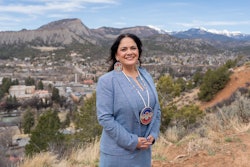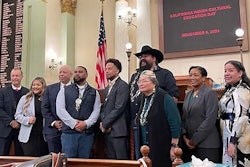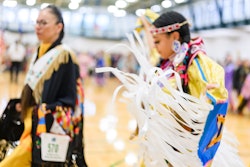With 13 percent of its nearly 670,000 residents considered Native, Alaska has one of the highest percentages of Native people of any state in the country.
It has long been hailed by Native leaders as a state where the Native vote can and does swing elections with the highest percentage of eligible Native voters of any state.
Now the Native residents of America’s largest state are wondering how Sen. John McCain’s choice of Alaska Gov. Sarah Palin as his running mate will affect their lives.
Like the hundreds of reporters, bloggers and Democratic strategists following this election, they are vetting Palin’s record on Native issues. And they are drawing varied conclusions.
“The Alaska population is pretty excited,” said Holly Miowak Stebing, a 20-year-old Inupiaq woman and Barack Obama supporter. “Within the Native population, it’s pretty mixed.”
The Anchorage woman got to meet Obama backstage at Invesco Field in Denver shortly before he took the stage to accept his party’s nomination for president. Stebing said the majority of her state’s Native population votes Democratic and likely won’t support McCain, despite Palin being on the ticket.
She criticized Palin for undermining causes she sees as beneficial to Alaska Natives, such as the governor’s opposition to a legislative proposition that would have stopped certain mining operations in the state from releasing toxic pollutants into water that would harm the health of humans or salmon. Stebing said salmon is important as a food and revenue source to Alaska Natives, but Palin opposed the measure, which was defeated Aug. 26 by more than 57 percent of Alaskan voters.
Stebing said, like Palin, Proposition 4 has drawn mixed response from Alaska Natives, some of whom opposed impeding mining operations that provide them much needed jobs.
“It’s really splitting the Native community,” Stebing said. “I think we need to preserve the water. I think we need to preserve the salmon.”
Not all those who support Native issues in Alaska see Palin’s candidacy as potentially harmful to Native interests.
The National Congress of American Indians long has seen Alaska as a battleground for the Native vote, one of about a dozen states where indigenous people are able to flex their political muscles and make their leaders listen.
Jacqueline Johnson, executive director of the NCAI, said Palin has had a limited time on the job as Alaska governor but has been supportive of Native causes.
“Sarah has been open to and concerned about Alaska Native issues,” she said. “She has come to a number of events that we have held while she is in town.”
Johnson noted that the vice presidential nominee’s husband has Native ties and says that helps the Republican ticket.
“I think that is good for Native issues that she is a candidate for vice president. That does strengthen the McCain nomination.”
Palin’s husband, Todd Palin, is 1/16th Yu’pik and has a Yu’pik grandmother. His mother, Blanche Palin, is respected by Alaska Natives, said Chuck Degnan, who is Inupiaq and a former Alaskan state representative.
Blanche Palin once served as secretary of the Alaska Federation of Natives, considered the state’s largest Native organization, Degnan said.
“She’s a very fine woman,” he said.
But he said he knows little about Todd Palin other than that he worked for oil company British Petroleum, a company many Alaska Natives hold in contempt. He said while most Alaska Natives knew Sarah Palin’s husband was part Yu’pik, few non-Indians did.
Degnan said he also was upset when he learned that Sarah Palin opposed Proposition 4, which he said was important in protecting tribal cultures in Alaska.
“It’s critical we have clean water for those animals so it doesn’t affect our health,” he said.
Degnan also criticized Palin for failing to allow Alaska Native representation on the Alaska Coastal Management Program — an organization that protects the state’s coasts.
Alaskan Republican Party officials did not return phone calls and e-mails.
While she understands Sarah Palin has only served as governor for two years, Stebing is disappointed she hasn’t done more to improve the lives of Alaska Natives, many of whom live in remote, poverty-stricken areas. They are places where some are so poor they lack running water and sewage and must carry out their human waste in large pails called “honey buckets.”
Stebing hopes whoever wins in November will address the dire needs of rural Alaska Natives.
“That we have that here in Alaska really bothers me,” she said. “This is the 21st century.”
Email the editor: [email protected]
© Copyright 2005 by DiverseEducation.com


















